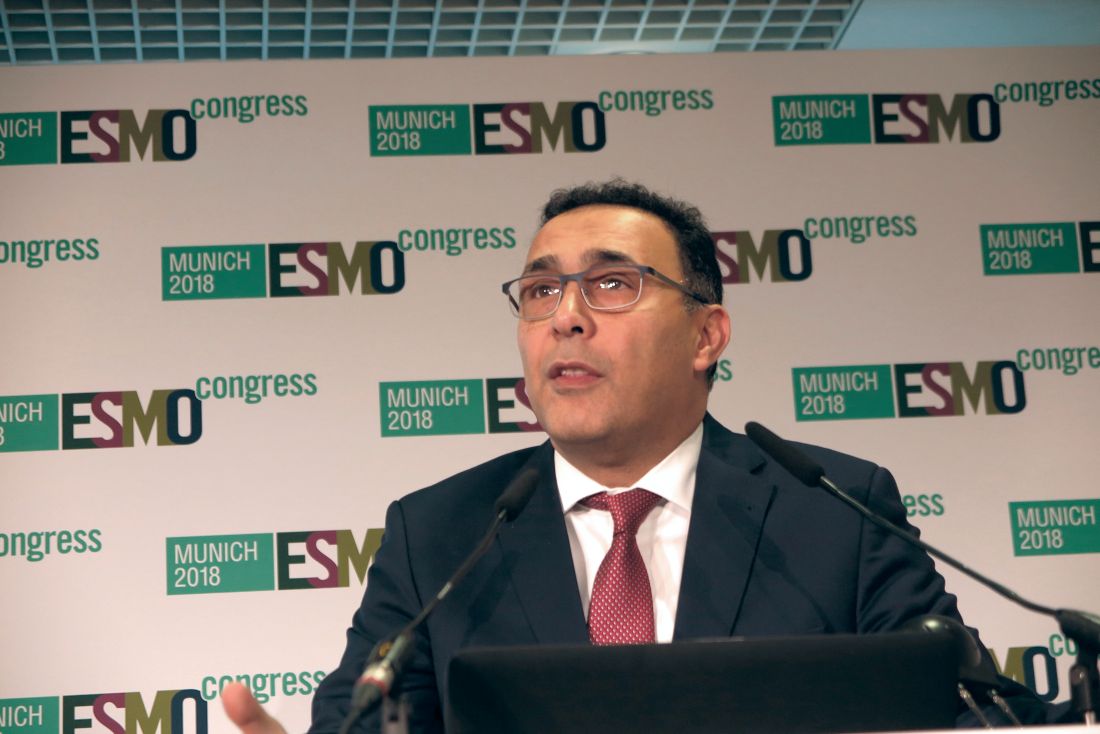User login
MUNICH – The term “practice-changing trial” usually implies change for the better, but results of a study comparing two regimens for patients with low-risk human papillomavirus–positive oropharyngeal cancer showed that cetuximab plus radiation was associated with worse local control and worse overall survival than the older standard of cisplatin plus radiation, investigators in the De-Escalate HPV trial reported.
Although rates of severe toxicity, the primary endpoint, were similar between cisplatin and radiation and cetuximab (Erbitux) plus radiation, 2-year overall survival was significantly worse with cetuximab, a finding that caught the investigators off guard, admitted Hisham Mehanna, PhD, a surgeon at the Institute of Head and Neck Studies and Education at the University of Birmingham (England).
“This difference in overall survival was underpinned by a significantly higher recurrence rate with cetuximab,” he said at the European Society of Medical Oncology Congress. “And that recurrence rate was both in locoregional control as well as in distant control.”
The results of the study reaffirm that cisplatin remains the standard of care in patients with low-risk human papillomavirus (HPV)–positive oropharyngeal cancer, and highlight the vital importance of carefully controlled clinical trials.
“I think there’s a salutary lesson: Changes in standard of care really should only be done of the basis of high-level, phase 3 comparative evidence, even, as was in our case, when treatments have been approved by regulatory bodies,” he said.
The trial raises the question of whether deintensification strategies should continue to be used in locally advanced HPV-positive oropharyngeal cancer, and suggests that clinicians should rethink the use of targeted agents in these patients in the absence of predictive biomarkers, commented Amanda Psyrri, MD, PhD, from the University of Athens and Attikon University Hospital.
The standard of care for patients with head and neck cancers is radiotherapy with concomitant cisplatin, which has been shown to improve absolute overall survival at the cost of increases in both acute and late severe toxicities.
The De-Escalate HPV trial was designed to see whether replacing cisplatin with cetuximab, a tyrosine kinase inhibitor targeted against the epidermal growth factor receptor, could be associated with less toxicity, better quality of life, and better swallowing in patients with low-risk HPV-positive oropharyngeal cancer.
The investigators enrolled 334 patients from 32 centers in the United Kingdom, Ireland, and the Netherlands, and randomly assigned them to therapy with 70 Gy radiotherapy given in 35 fractions over 7 weeks, plus either intravenous cisplatin 100 mg/m2 per day on days 1, 22, and 43, or IV cetuximab at a 400 mg pretreatment loading dose, then 250 mg weekly.
There were no significant differences between treatment arms in the primary endpoint of toxicity, either severe (grade 3-5) or all grades of toxicity (1-5). In addition, there were no significant differences between the treatment arms in global health status assessed by the European Organization for the Research and Treatment of Cancer Quality of Life Questionnaire – Core Questionnaire (EORTC QLQ-C30) or in swallowing as evaluated by the MD Anderson Dysphagia Inventory-Global.
There were, however, significantly more serious adverse events in the cisplatin arm, at 162 versus 95 in the cetuximab arm.
But as noted before, the investigators were surprised to see that 2-year overall survival was worse with cetuximab at 89.4%, compared with 97.5% for cisplatin (P = .001). The hazard ratio for death with cetuximab was 4.99 and the adjusted HR was 5.94 (P = .001). Dr. Mehanna did not report factors considered in the adjusted HR.
The number needed to treat for harm was 12.
“Our study was not powered to identify a difference in survival, and hence our surprise to find a significantly worse overall survival with cetuximab,” he said.
The 2-year recurrence rates were 6.0% in the cisplatin arm versus 16.1% in the cetuximab arm (HR, 3.39; P = .0007).
Locoregional recurrence rates were 3% in the cisplatin arm versus 12% in the cetuximab arm and rates of distant recurrence were 3% versus 9%, respectively.
The results suggest that clinicians should be cautious when considering deescalation treatments that reduce the use of systemic chemotherapy, either with radiotherapy alone or with surgery, Dr. Mehanna said.
In a briefing prior to the presentation of the data in a presidential symposium, discussant Jean-Pascal Machiels, MD, from the University Clinic Saint-Luc in Brussels, said that, prior to this study, “the common belief was that [cetuximab and radiation] could be used, maybe, instead of chemoradiation in these patients, because also we believed that this may decrease toxicity.
“But clearly we have a signal that the chemoradiation has more activity in this setting, and it should remain the standard of care,” he continued.
Dr. Machiels cautioned that the findings cannot be extrapolated to patients with HPV-negative disease.
The study was sponsored by the University of Warwick (England), University of Birmingham, University of Oxford (England), and Cancer Research UK. Dr. Mehanna reported honoraria from AstraZeneca, MSD, Sanofi Pasteur, and Merck, and is a director and stockholder of the Warwickshire Head and Neck Clinic. Dr. Psyrri reported honoraria from Merck Serono, Roche, MSD, AstraZeneca, Bristol-Myers Squibb, Bayer, Pfizer, Medscape, and Prime Oncology. Dr. Machiels reported a consulting or advisory role with Boehringer Ingelheim, Debiopharm Group, Innate Pharma, Merck, Nanobiotix, and Pfizer, and research funding from Bayer, Janssen Pharmaceuticals, Novartis, and Sanofi.
SOURCE: Mehanna H et al. ESMO 2018, Abstract LBA9_PR.
MUNICH – The term “practice-changing trial” usually implies change for the better, but results of a study comparing two regimens for patients with low-risk human papillomavirus–positive oropharyngeal cancer showed that cetuximab plus radiation was associated with worse local control and worse overall survival than the older standard of cisplatin plus radiation, investigators in the De-Escalate HPV trial reported.
Although rates of severe toxicity, the primary endpoint, were similar between cisplatin and radiation and cetuximab (Erbitux) plus radiation, 2-year overall survival was significantly worse with cetuximab, a finding that caught the investigators off guard, admitted Hisham Mehanna, PhD, a surgeon at the Institute of Head and Neck Studies and Education at the University of Birmingham (England).
“This difference in overall survival was underpinned by a significantly higher recurrence rate with cetuximab,” he said at the European Society of Medical Oncology Congress. “And that recurrence rate was both in locoregional control as well as in distant control.”
The results of the study reaffirm that cisplatin remains the standard of care in patients with low-risk human papillomavirus (HPV)–positive oropharyngeal cancer, and highlight the vital importance of carefully controlled clinical trials.
“I think there’s a salutary lesson: Changes in standard of care really should only be done of the basis of high-level, phase 3 comparative evidence, even, as was in our case, when treatments have been approved by regulatory bodies,” he said.
The trial raises the question of whether deintensification strategies should continue to be used in locally advanced HPV-positive oropharyngeal cancer, and suggests that clinicians should rethink the use of targeted agents in these patients in the absence of predictive biomarkers, commented Amanda Psyrri, MD, PhD, from the University of Athens and Attikon University Hospital.
The standard of care for patients with head and neck cancers is radiotherapy with concomitant cisplatin, which has been shown to improve absolute overall survival at the cost of increases in both acute and late severe toxicities.
The De-Escalate HPV trial was designed to see whether replacing cisplatin with cetuximab, a tyrosine kinase inhibitor targeted against the epidermal growth factor receptor, could be associated with less toxicity, better quality of life, and better swallowing in patients with low-risk HPV-positive oropharyngeal cancer.
The investigators enrolled 334 patients from 32 centers in the United Kingdom, Ireland, and the Netherlands, and randomly assigned them to therapy with 70 Gy radiotherapy given in 35 fractions over 7 weeks, plus either intravenous cisplatin 100 mg/m2 per day on days 1, 22, and 43, or IV cetuximab at a 400 mg pretreatment loading dose, then 250 mg weekly.
There were no significant differences between treatment arms in the primary endpoint of toxicity, either severe (grade 3-5) or all grades of toxicity (1-5). In addition, there were no significant differences between the treatment arms in global health status assessed by the European Organization for the Research and Treatment of Cancer Quality of Life Questionnaire – Core Questionnaire (EORTC QLQ-C30) or in swallowing as evaluated by the MD Anderson Dysphagia Inventory-Global.
There were, however, significantly more serious adverse events in the cisplatin arm, at 162 versus 95 in the cetuximab arm.
But as noted before, the investigators were surprised to see that 2-year overall survival was worse with cetuximab at 89.4%, compared with 97.5% for cisplatin (P = .001). The hazard ratio for death with cetuximab was 4.99 and the adjusted HR was 5.94 (P = .001). Dr. Mehanna did not report factors considered in the adjusted HR.
The number needed to treat for harm was 12.
“Our study was not powered to identify a difference in survival, and hence our surprise to find a significantly worse overall survival with cetuximab,” he said.
The 2-year recurrence rates were 6.0% in the cisplatin arm versus 16.1% in the cetuximab arm (HR, 3.39; P = .0007).
Locoregional recurrence rates were 3% in the cisplatin arm versus 12% in the cetuximab arm and rates of distant recurrence were 3% versus 9%, respectively.
The results suggest that clinicians should be cautious when considering deescalation treatments that reduce the use of systemic chemotherapy, either with radiotherapy alone or with surgery, Dr. Mehanna said.
In a briefing prior to the presentation of the data in a presidential symposium, discussant Jean-Pascal Machiels, MD, from the University Clinic Saint-Luc in Brussels, said that, prior to this study, “the common belief was that [cetuximab and radiation] could be used, maybe, instead of chemoradiation in these patients, because also we believed that this may decrease toxicity.
“But clearly we have a signal that the chemoradiation has more activity in this setting, and it should remain the standard of care,” he continued.
Dr. Machiels cautioned that the findings cannot be extrapolated to patients with HPV-negative disease.
The study was sponsored by the University of Warwick (England), University of Birmingham, University of Oxford (England), and Cancer Research UK. Dr. Mehanna reported honoraria from AstraZeneca, MSD, Sanofi Pasteur, and Merck, and is a director and stockholder of the Warwickshire Head and Neck Clinic. Dr. Psyrri reported honoraria from Merck Serono, Roche, MSD, AstraZeneca, Bristol-Myers Squibb, Bayer, Pfizer, Medscape, and Prime Oncology. Dr. Machiels reported a consulting or advisory role with Boehringer Ingelheim, Debiopharm Group, Innate Pharma, Merck, Nanobiotix, and Pfizer, and research funding from Bayer, Janssen Pharmaceuticals, Novartis, and Sanofi.
SOURCE: Mehanna H et al. ESMO 2018, Abstract LBA9_PR.
MUNICH – The term “practice-changing trial” usually implies change for the better, but results of a study comparing two regimens for patients with low-risk human papillomavirus–positive oropharyngeal cancer showed that cetuximab plus radiation was associated with worse local control and worse overall survival than the older standard of cisplatin plus radiation, investigators in the De-Escalate HPV trial reported.
Although rates of severe toxicity, the primary endpoint, were similar between cisplatin and radiation and cetuximab (Erbitux) plus radiation, 2-year overall survival was significantly worse with cetuximab, a finding that caught the investigators off guard, admitted Hisham Mehanna, PhD, a surgeon at the Institute of Head and Neck Studies and Education at the University of Birmingham (England).
“This difference in overall survival was underpinned by a significantly higher recurrence rate with cetuximab,” he said at the European Society of Medical Oncology Congress. “And that recurrence rate was both in locoregional control as well as in distant control.”
The results of the study reaffirm that cisplatin remains the standard of care in patients with low-risk human papillomavirus (HPV)–positive oropharyngeal cancer, and highlight the vital importance of carefully controlled clinical trials.
“I think there’s a salutary lesson: Changes in standard of care really should only be done of the basis of high-level, phase 3 comparative evidence, even, as was in our case, when treatments have been approved by regulatory bodies,” he said.
The trial raises the question of whether deintensification strategies should continue to be used in locally advanced HPV-positive oropharyngeal cancer, and suggests that clinicians should rethink the use of targeted agents in these patients in the absence of predictive biomarkers, commented Amanda Psyrri, MD, PhD, from the University of Athens and Attikon University Hospital.
The standard of care for patients with head and neck cancers is radiotherapy with concomitant cisplatin, which has been shown to improve absolute overall survival at the cost of increases in both acute and late severe toxicities.
The De-Escalate HPV trial was designed to see whether replacing cisplatin with cetuximab, a tyrosine kinase inhibitor targeted against the epidermal growth factor receptor, could be associated with less toxicity, better quality of life, and better swallowing in patients with low-risk HPV-positive oropharyngeal cancer.
The investigators enrolled 334 patients from 32 centers in the United Kingdom, Ireland, and the Netherlands, and randomly assigned them to therapy with 70 Gy radiotherapy given in 35 fractions over 7 weeks, plus either intravenous cisplatin 100 mg/m2 per day on days 1, 22, and 43, or IV cetuximab at a 400 mg pretreatment loading dose, then 250 mg weekly.
There were no significant differences between treatment arms in the primary endpoint of toxicity, either severe (grade 3-5) or all grades of toxicity (1-5). In addition, there were no significant differences between the treatment arms in global health status assessed by the European Organization for the Research and Treatment of Cancer Quality of Life Questionnaire – Core Questionnaire (EORTC QLQ-C30) or in swallowing as evaluated by the MD Anderson Dysphagia Inventory-Global.
There were, however, significantly more serious adverse events in the cisplatin arm, at 162 versus 95 in the cetuximab arm.
But as noted before, the investigators were surprised to see that 2-year overall survival was worse with cetuximab at 89.4%, compared with 97.5% for cisplatin (P = .001). The hazard ratio for death with cetuximab was 4.99 and the adjusted HR was 5.94 (P = .001). Dr. Mehanna did not report factors considered in the adjusted HR.
The number needed to treat for harm was 12.
“Our study was not powered to identify a difference in survival, and hence our surprise to find a significantly worse overall survival with cetuximab,” he said.
The 2-year recurrence rates were 6.0% in the cisplatin arm versus 16.1% in the cetuximab arm (HR, 3.39; P = .0007).
Locoregional recurrence rates were 3% in the cisplatin arm versus 12% in the cetuximab arm and rates of distant recurrence were 3% versus 9%, respectively.
The results suggest that clinicians should be cautious when considering deescalation treatments that reduce the use of systemic chemotherapy, either with radiotherapy alone or with surgery, Dr. Mehanna said.
In a briefing prior to the presentation of the data in a presidential symposium, discussant Jean-Pascal Machiels, MD, from the University Clinic Saint-Luc in Brussels, said that, prior to this study, “the common belief was that [cetuximab and radiation] could be used, maybe, instead of chemoradiation in these patients, because also we believed that this may decrease toxicity.
“But clearly we have a signal that the chemoradiation has more activity in this setting, and it should remain the standard of care,” he continued.
Dr. Machiels cautioned that the findings cannot be extrapolated to patients with HPV-negative disease.
The study was sponsored by the University of Warwick (England), University of Birmingham, University of Oxford (England), and Cancer Research UK. Dr. Mehanna reported honoraria from AstraZeneca, MSD, Sanofi Pasteur, and Merck, and is a director and stockholder of the Warwickshire Head and Neck Clinic. Dr. Psyrri reported honoraria from Merck Serono, Roche, MSD, AstraZeneca, Bristol-Myers Squibb, Bayer, Pfizer, Medscape, and Prime Oncology. Dr. Machiels reported a consulting or advisory role with Boehringer Ingelheim, Debiopharm Group, Innate Pharma, Merck, Nanobiotix, and Pfizer, and research funding from Bayer, Janssen Pharmaceuticals, Novartis, and Sanofi.
SOURCE: Mehanna H et al. ESMO 2018, Abstract LBA9_PR.
REPORTING FROM ESMO 2018
Key clinical point: Radiation and concomitant cisplatin remains the standard of care for patients with low-risk human papillomavirus–positive oropharyngeal cancer.
Major finding: The 2-year overall survival was 97.5% with cisplatin versus 89.4% with cetuximab (P = .001).
Study details: A randomized trial in 334 patients with low-risk oropharyngeal cancer.
Disclosures: The study was sponsored by the University of Warwick (England), University of Birmingham, University of Oxford (England), and Cancer Research UK. Dr. Mehanna reported honoraria from AstraZeneca, MSD, Sanofi Pasteur, and Merck, and is a director and stockholder of the Warwickshire Head and Neck Clinic. Dr. Psyrri reported honoraria from Merck Serono, Roche, MSD, AstraZeneca, Bristol-Myers Squibb, Bayer, Pfizer, Medscape, and Prime Oncology. Dr. Machiels reported a consulting or advisory role with Boehringer Ingelheim, Debiopharm Group, Innate Pharma, Merck, Nanobiotix, and Pfizer, and research funding from Bayer, Janssen Pharmaceuticals, Novartis, and Sanofi.
Source: Mehanna H et al. ESMO 2018, Abstract LBA9_PR.


